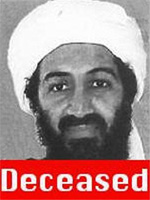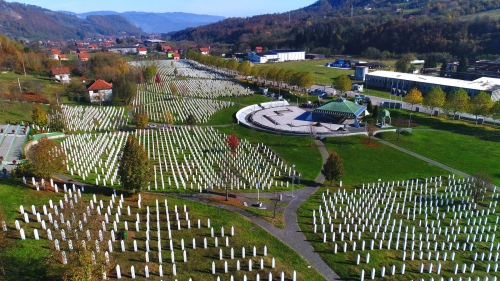What's next after Bin Laden's death?
 |
Arabs are proving that they are parting ways with the Bin Laden dogma; but can the West find the moral high ground to address this region's quest for justice?
With the killing Monday of Osama Bin Laden in a US commando raid in Pakistan the biggest manhunt in modern history comes to a sensational end. Bin Laden's demise is a major victory for President Barack Obama and his allies in the 10-year-old war on terrorism. It also brings closure to the relatives of victims who had perished in the 9/11 attacks on New York and Washington. But does the death of Bin Laden also mean the end of Al-Qaeda as well? The hunt for Bin Laden was overshadowed by dramatic events in the region. The invasion of Afghanistan and the toppling of the Taleban dragged the United States and its NATO allies into a long and frustrating war whose chapters are still unfolding. Two years on, in 2003, President George W. Bush used flimsy and fabricated evidence to invade and occupy Iraq, unleashing chaos and destruction on that country in a war that claimed hundreds of thousands of lives. Afghanistan and Iraq became battlegrounds for Al-Qaeda extremists against Western occupation. The limelight moved away from Bin Laden, whose trail was lost, and instead the world found itself engaged in a war of attrition against terrorists on many fronts.
Al-Qaeda is now active in Pakistan, North Africa, Somalia and Yemen while cells have been discovered in Britain, Germany, Spain and other parts of Europe. Bin Laden, who many believed had died of natural causes somewhere in the mountains of Waziristan, had become a symbol for disillusioned Muslim youths. His dogma lived on and found believers in many Arab and Muslim countries.
But in recent years he had become inconsequential as terror groups set up local organizations. His deadly franchise relied on local mentors and leaders who had embraced his message and mission. His absence from the scene and the success of many governments in containing his followers had limited Al-Qaeda's overall influence on global and regional events. His killing is a triumph for America over the man who has become a household name all over the world, but it is, sadly, a symbolic victory nonetheless.
| Osama Bin Laden had lost his appeal to Arab and Muslim masses long time ago. |
Pundits and historians will spend many months and years debating Osama Bin Laden for different reasons. He was a product of the last chapter of the Cold War, finding his mission and cause in the obscure terrains of Afghanistan during the Soviet occupation of that country. His story, the heir of an affluent business family, who chose to declare war in Afghanistan against the Soviet infidels, is an intriguing one. His survival and success in commanding loyalty among fellow terrorists, eventually leading to the formation of Al-Qaeda has never been investigated in full. His association with the Taleban, an extremist movement that took over Afghanistan in the late 1990s, is both dramatic and crucial to understanding why and how he had declared war on America.
And his penultimate challenge to the world's only superpower, culminating in the 9/11 earth-shattering attacks, remains controversial to this day. In fact many Arabs and Muslims, not to mention Americans, don't really know who Bin Laden really was, and how he was able to pull out one of the biggest, and most elaborate, terrorist attacks in history.
It is safe to say that Osama Bin Laden had lost his appeal to Arab and Muslim masses long time ago. Reactions to his death are fundamentally different in the Middle East from those in America and the West at large. The "Arab Spring," popular uprisings in Tunisia, Egypt, Libya, Yemen and Syria, underline this fact. Bin Laden's ideological beliefs were missing in those rebellious countries. If anything they prove that his militant and narrow interpretation of Islam were rejected by millions of Arabs and Muslims.
Instead protesters were calling for civil rights, freedom of expression, social and economic justice and Western-style democracy. In his final days Osama Bin Laden would have been dumbfounded by the events taking over the Arab world. The peaceful deposition of the presidents of Tunisia and Egypt must have been an anathema to all what he believed in.
Conspiracy theories about Bin Laden will continue to multiply. Who was he really? Was he a pawn in a larger game plan, or was he a free agent with an ambitious scheme to change the world? And yet he has single-handedly altered our lives. The post 9/11 world is remarkably different from what some us still remember. Bin Laden and Al-Qaeda have transformed our world, many would say for the worse, where Islamophobia, racial profiling, supporting Palestinian national struggle for liberation, among others, are now controversial matters.
And now that America has killed its worst enemy where does that leave us? Aside from the continuing wars in Iraq and Afghanistan, two very complex issues, Al-Qaeda survives in many hotspots. Its leader may have been eliminated but the dogma will survive for a while longer. The West needs to understand the Bin Laden phenomenon, as so do many Arab and Muslim regimes. His death may inspire few more to follow in his footsteps, but that is hardly the problem. The challenge is to understand what motivates his followers and drive people to adopt his message. It is a matter of flawed policies, cultural schisms and uneven approach to issues. Bin Laden's grievances are shared by many.
Osama Bin Laden, as a rebellious figure, has already been forgotten by many in the Arab and Muslim worlds. The war on terror will continue in other shapes and forms, but the root causes of the Bin Laden phenomenon may linger on for a while. Arabs are proving that they are parting ways with the Bin Laden dogma; but can the West find the moral high ground to address this region's quest for justice?
Osama Al Sharif is a writer for Arab News.
Topics: Afghanistan, Conflicts And War, Osama Bin Laden
Views: 3353
Related Suggestions

















